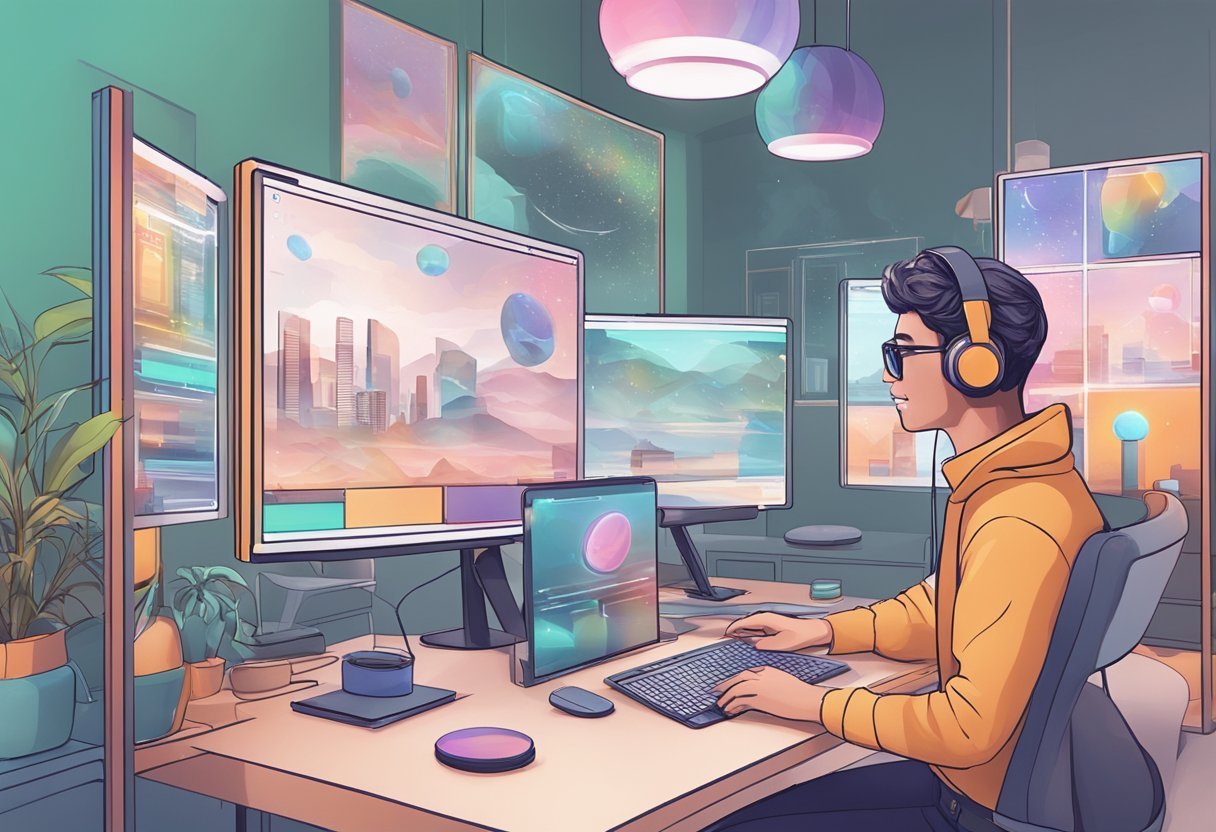The concept of a metaverse has been gaining traction in recent years, with more and more people becoming interested in the possibilities that it offers. A metaverse can be thought of as a shared virtual space that allows users to interact with each other and with digital objects in a way that is similar to the physical world. The idea is to create an immersive experience that is more engaging than traditional forms of media. In this blog post, we will discuss metaverse applications and dive into the software applications powering the metaverse
One of the key applications of a metaverse is in gaming. Many game developers are already exploring the possibilities of creating immersive virtual worlds that allow players to interact with each other and with the environment in a way that is more engaging than traditional games. The metaverse also has applications in education, where it could be used to create immersive learning environments that allow students to explore complex topics in a more engaging way. The metaverse has the potential to revolutionize social media, providing a more immersive and engaging way for people to connect with each other online.
What is Metaverse Software
Metaverse software is a type of application that enables users to experience a virtual world that is similar to the physical world.
These applications work by creating a shared, immersive, and persistent 3D virtual space where users can interact with each other in real-time. Metaverse software is built using a combination of technologies such as virtual reality, augmented reality, blockchain, and cloud computing.
Technology Behind Metaverse Applications
Metaverse applications use a combination of technologies such as virtual reality (VR), augmented reality (AR), blockchain, and cloud computing to create a shared virtual space. VR technology enables users to experience a fully immersive 3D environment, while AR technology allows users to overlay digital information on the physical world.
Blockchain technology enables secure transactions and ownership of virtual assets, while cloud computing provides the necessary computing power and storage for metaverse applications.
Metaverse Use Cases
Metaverse applications have a wide range of use cases across different industries. For example, in the gaming industry, metaverse applications are used to create immersive gaming experiences that allow users to interact with each other in real-time.
In the education industry, metaverse applications are used to create virtual classrooms and training simulations. In the real estate industry, metaverse applications are used to create virtual tours of properties and to showcase architectural designs.
Metaverse software is a powerful tool that enables users to experience a virtual world that is similar to the physical world. With the use of advanced technologies such as VR, AR, blockchain, and cloud computing, metaverse applications have a wide range of use cases across different industries.
How to Use Metaverse
Metaverse technology is gaining popularity, and many people are curious about how to use it. The following steps explain how to use the metaverse:
- Choose a Metaverse Platform: There are several metaverse platforms available, and users need to choose one that suits their needs. Some popular platforms include Second Life, VRChat, and Decentraland.
- Create an Avatar: Once a platform has been chosen, the user needs to create an avatar. The avatar is a virtual representation of the user, and it can be customized to look like the user or any other desired appearance.
- Explore the Metaverse: After creating an avatar, the user can explore the metaverse. The metaverse is a virtual world that offers many experiences, including games, social interactions, and educational opportunities.
- Participate in Activities: The metaverse offers many activities that users can participate in. For example, users can attend virtual concerts, join virtual sports teams, or attend virtual classes.
- Buy and Sell Virtual Assets: The metaverse offers a marketplace where users can buy and sell virtual assets, such as clothing, furniture, and even virtual real estate.
- Connect with Others: The metaverse is a social platform, and users can connect with others from all over the world. Users can join virtual communities, attend virtual events, and even create their virtual worlds.
The metaverse is a virtual world that offers many opportunities for users to explore, learn, and connect with others. By following the above steps, users can experience the metaverse and all that it has to offer.
Key Metaverse Applications and Software
The metaverse has a wide range of applications across various industries, including gaming, education, healthcare, and real estate. Here are seven key metaverse applications and software:
1. Decentraland
Decentraland is a virtual world that allows users to create, experience, and monetize content and applications. It is built on the Ethereum blockchain, which enables users to own and trade virtual land, items, and experiences. Decentraland is popular among gamers, artists, and entrepreneurs, who use it for gaming, socializing, and commerce.
2. AltSpaceVR
AltSpaceVR is a social VR platform that allows users to meet, interact, and collaborate in virtual spaces. It is compatible with various VR headsets and devices, making it accessible to a wide range of users. AltSpaceVR is used for events, meetings, education, and entertainment, and has a vibrant community of users and creators.
3. VRChat
VRChat is a social VR platform that allows users to create and explore virtual worlds and avatars. It is popular among gamers, artists, and meme enthusiasts, who use it for socializing, role-playing, and content creation. VRChat has a user-friendly interface and supports various VR devices and platforms.
4. Spatial
Spatial is a collaborative VR platform that allows users to work, learn, and play together in virtual environments. It is designed for remote teams, classrooms, and events, and includes features such as 3D modeling, screen sharing, and hand tracking. Spatial supports various VR devices and platforms and has integrations with popular tools such as Zoom and Slack.
5. Somnium Space
Somnium Space is a virtual world that allows users to create, own, and trade virtual land, buildings, and experiences. It is built on the Ethereum blockchain and uses a voxel-based engine for rendering. Somnium Space is used for gaming, socializing, and commerce, and has a growing community of users and developers.
6. NeosVR
NeosVR is a virtual world that allows users to create and share interactive content and experiences. It includes features such as scripting, physics, and multiplayer, and supports various VR devices and platforms. NeosVR is used for gaming, education, and research, and has a passionate community of users and contributors.
7. Mozilla Hubs
Mozilla Hubs is a social VR platform that allows users to create and join virtual rooms and spaces. It is accessible through any web browser and supports various devices and platforms. Mozilla Hubs is used for meetings, events, education, and entertainment, and has a user-friendly interface and open-source codebase.
Metaverse Platforms and Ecosystems
The metaverse is a virtual space where users can interact with each other in a persistent and decentralized way. The concept of the metaverse has been around for years, but it has gained significant traction in recent times. Today, there are several major players in the metaverse space, including Meta (formerly Facebook), Microsoft, and other platforms.
Major Players
Meta is one of the most prominent players in the metaverse space. The company is investing heavily in the development of the metaverse and has recently rebranded itself as Meta to reflect this focus. Microsoft is also a significant player in the metaverse space, with its HoloLens technology and other initiatives.
Virtual Worlds and Real Estate
Virtual worlds are a significant part of the metaverse ecosystem. These worlds are persistent, decentralized environments that allow users to interact with each other in real-time.
Decentraland and The Sandbox are two popular virtual worlds that are built on blockchain technology. Real estate is also a significant part of the metaverse ecosystem, with users buying and selling virtual land within these worlds.
Interoperability and Standards
Interoperability and standards are essential for the growth and development of the metaverse. Interoperability allows users to move seamlessly between different virtual worlds and platforms, while standards ensure that these worlds and platforms are compatible with each other.
The development of interoperability and standards is a significant focus for many companies in the metaverse space.
The metaverse is a rapidly evolving ecosystem with several major players, virtual worlds, and real estate. Interoperability and standards are crucial for the growth and development of the metaverse, and many companies are investing heavily in these areas.
User Experience in the Metaverse
As the metaverse industry continues to grow, user experience has become an essential factor for the success of metaverse applications. The metaverse is a virtual world where users can interact with each other and the environment using digital avatars. The user experience in the metaverse is influenced by various factors such as avatars and digital identity, accessibility and devices, and privacy and security concerns.
Avatars and Digital Identity
The avatar is a representation of the user in the metaverse. It is essential to have a good avatar design to enhance the user experience. The avatar should be customizable, allowing users to personalize their appearance and express themselves. Users should be able to change their avatar’s clothes, hair, and accessories to create a unique digital identity.
Accessibility and Devices
Accessibility is another critical factor in the metaverse’s user experience. The metaverse should be accessible to users with different devices, such as smartphones, tablets, and VR headsets. The user experience should be consistent across all devices, and the application should be optimized for each device’s capabilities. The application should also be accessible to users with disabilities, such as hearing or visual impairments.
Privacy and Security Concerns
Privacy and security concerns are critical in the metaverse. Users should be able to control their data and information and decide who can access it. The application should have robust security measures to prevent data breaches and protect users’ personal information. The metaverse should also have safety measures to prevent cyberbullying and harassment.
The user experience in the metaverse is crucial for the success of metaverse applications. The avatar design, accessibility, and privacy and security concerns are essential factors that affect the user experience. Metaverse applications should be designed to provide a seamless and enjoyable user experience across all devices while ensuring users’ privacy and security.
Metaverse Applications by Industry
The metaverse is a virtual world that has various applications across different industries. Here are some of the industries that have been exploring the metaverse and their potential applications.
Gaming and Entertainment
The gaming and entertainment industry has been at the forefront of the metaverse revolution. Games like Fortnite and Roblox have already integrated metaverse elements into their gameplay. Unity and Epic Games have also been exploring the metaverse as a means of creating more immersive gaming experiences.
The metaverse has the potential to create new revenue streams for gaming companies and provide gamers with new gaming experiences.
Education and Training
The metaverse has the potential to revolutionize education and training. The metaverse can provide students with immersive learning experiences that can help them develop new skills.
The metaverse can also be used for vocational skill training, providing students with hands-on training in a virtual environment. The metaverse can also be used to provide remote training to employees, reducing the need for travel and increasing accessibility.
Healthcare and Engineering
The metaverse can also be used in the healthcare and engineering industries. The metaverse can be used to create virtual simulations that can help healthcare professionals and engineers test new products and procedures. The metaverse can also be used to provide patients with virtual healthcare experiences, reducing the need for physical visits to healthcare facilities.
Retail and Advertising
The metaverse has the potential to revolutionize the retail and advertising industries. Companies like Gucci have already started exploring the metaverse as a means of creating virtual stores. The metaverse can provide retailers with new ways of showcasing their products and creating immersive shopping experiences. The metaverse can also be used for advertising, providing advertisers with new ways of engaging with consumers.
The metaverse has various applications across different industries. The metaverse has the potential to create new revenue streams, provide immersive experiences, and revolutionize industries.
Economic and Social Impact
The metaverse is a virtual world that has the potential to revolutionize the way we interact and conduct business. The economic and social impact of the metaverse is immense, with the potential to create new markets, new types of businesses, new employment opportunities, and opening up new ways of working.
Metaverse Economy
The metaverse economy is a rapidly growing market that is generating significant revenue. The economy is driven by the sale of virtual goods, digital real estate, and the creation of new digital experiences. Cryptocurrency and non-fungible tokens (NFTs) are also becoming increasingly important in the metaverse economy, with many transactions being conducted using these digital assets.
Social Media and Community
The metaverse has the potential to create new social media platforms and communities that are more immersive and engaging than traditional social media. These platforms and communities can provide new opportunities for social interaction and collaboration, as well as new ways to monetize digital content.
Governance and Regulation
As the metaverse continues to grow, there is a need for governance and regulation to ensure that the virtual world is safe and secure for all users. Public blockchains and decentralized governance models are being explored as potential solutions to the governance challenges of the metaverse.
However, there are also concerns about the potential for abuse and exploitation in the metaverse, which will need to be addressed through effective regulation and oversight.
The metaverse has the potential to create significant economic and social benefits, but it will require careful management and regulation to ensure that these benefits are realized in a safe and sustainable manner.
Frequently Asked Questions
What are the leading industries currently integrating metaverse technology?
Metaverse technology is being integrated into various industries, including gaming, entertainment, retail, and real estate. Gaming companies are at the forefront of metaverse development, with virtual reality and augmented reality gaming experiences gaining popularity.
Retailers are exploring the use of metaverse technology to create immersive shopping experiences, while real estate companies are using it to showcase properties virtually.
How can the metaverse enhance educational experiences?
The metaverse has the potential to revolutionize education by providing immersive and interactive learning experiences. Virtual classrooms, simulations, and educational games are just a few examples of how the metaverse can enhance educational experiences.
With the use of metaverse technology, students can explore historical events, scientific concepts, and cultural experiences in a more engaging and memorable way.
What are the primary advantages and challenges associated with the adoption of metaverse?
The primary advantages of metaverse adoption include enhanced user engagement, improved customer experiences, and increased revenue opportunities. However, there are also several challenges associated with the adoption of metaverse, including technical limitations, privacy concerns, and the need for standardization and interoperability.
In what ways could the metaverse shape the future of digital interaction?
The metaverse has the potential to shape the future of digital interaction by creating immersive and interactive experiences that blur the line between the physical and digital worlds.
With the use of virtual and augmented reality, the metaverse can provide users with a more realistic and engaging experience, leading to new forms of social interaction, entertainment, and commerce.
Can you provide examples of successful metaverse implementations?
Some successful metaverse implementations include Second Life, Minecraft, and Fortnite. Second Life is a virtual world that allows users to create and interact with their own avatars, while Minecraft is a sandbox game that allows players to build and explore virtual worlds. Fortnite is a popular battle royale game that has incorporated metaverse elements, such as virtual concerts and in-game events.
How do metaverse applications impact the concept of virtual economies?
Metaverse applications have the potential to impact the concept of virtual economies by creating new opportunities for commerce and trade within virtual worlds.
With the use of blockchain technology, metaverse applications can create secure and transparent virtual marketplaces, allowing users to buy, sell, and trade virtual goods and services. This has the potential to create new revenue streams and economic opportunities within the digital realm.




